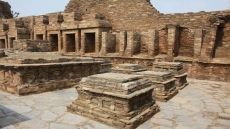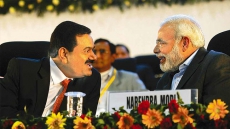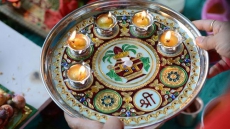India and Pakistan on Sunday quietly resumed their stalled dialogue in Bangkok, with their National Security Advisors discussing an array of contentious bilateral issues and promising to "carry forward the constructive engagement".
A joint statement issued after the meeting said Ajit Doval of India and Naseer Khan Janjua of Pakistan held discussions "in a candid, cordial and constructive atmosphere".
Foreign secretaries S. Jaishanker of India and Aizaz Ahmad Chaudhry of Pakistan took part in the meeting.
"Discussions covered peace and security, terrorism, Jammu and Kashmir, and other issues including tranquility along the LoC (Line of Control)", the statement said.
Doval and Janjua "were guided by the vision of the two leaders for a peaceful, stable and prosperous South Asia. It was agreed to carry forward the constructive engagement", it said.
Official pictures showed Doval and Janjua shaking hands in a warm atmosphere at the venue.
The Sunday meeting followed the meeting of Prime Ministers Narendra Modi of India and Nawaz Sharif of Pakistan in Paris on the sidelines of the Conference of Parties (CoP) 21 climate summit on November 30.
After a long gap, Modi and Sharif had a brief but warm chat as they bumped into each other in Paris.
This was the first meeting between them since they met on the sidelines of the Shanghai Cooperation Organisation (SCO) meeting in Ufa, Russia, in July this year.
After the Ufa meet, they directed their foreign secretaries to initiate the process of renewal of bilateral talks, including meetings between their national security advisers.
But talks between Doval and his then Pakistani counterpart Sartaj Aziz scheduled in New Delhi in August were axed after the Pakistan envoy here insisted on inviting Hurriyat leaders for a reception in honour of Aziz.
The Bangkok meeting came ahead of External Affairs Minister Sushma Swaraj's visit this week to Pakistan for the Heart of Asia conference - a multilateral engagement on Afghanistan.
Post Ufa, firing and shelling across the LoC and the international border that split Jammu and Kashmir between India and Pakistan dramatically increased, causing serious strains in bilateral ties.
The border incidents have since scaled down, as dramatically, leading to the Bangkok meet.
While India considers Pakistan-backed terrorism as a key issue in the normalization of bilateral relations, Islamabad wants the focus on Jammu and Kashmir, whose ownership it contends.
After Ufa, the Pakistani military brass had stated that all further dialogue with India would have to cover the issue of Jammu and Kashmir, where a separatist campaign since 1989 has claimed thousands of lives.
The Doval-Janjua meeting received mixed reaction in India, with one Congress leader questioning the Modi government's apparent U-turn vis-a-vis Pakistan.
Manish Tewari called it a "grand betrayal" by the government "and a reflection of the flip flop on its Pakistan policy".
Former Jammu and Kashmir chief minister Omar Abdullah said it was good to see India and Pakistan resume the dialogue process.
"Perhaps this is the way quiet progress will be made away from each other's capitals and the glare of media-driven expectations.
"Now the challenge is to make sure the Indo-Pakistan dialogue process is ring-fenced from incidents designed specifically to derail i





